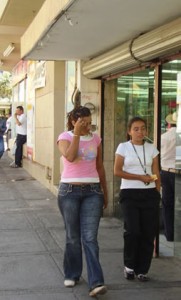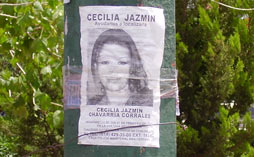By Katie Hudson-Martinez/feature editor

Imagine living in a place where innocent women are targeted for rape and murder every day.
Mothers, sisters and daughters trying to make their way home from work or school disappear in the night, their nude and mutilated bodies discovered with the light of day.
Women in the U.S. border town of Juarez, Mexico, don’t have to imagine because that is their life.
Juarez, a city of more than 1.5 million people, is home to hundreds of foreign-owned factories, or maquiladoras, where goods are manufactured for U.S. consumption at a mere fraction of U.S. labor costs.
The women of the maquiladoras work long hours for a minimum wage of $4.25 per day, and many women have to make their way home in the dead of night.
Since NAFTA was approved in 1993 and a flood of multi-national factories cropped up in Juarez, more than 400 young girls and women have been confirmed murdered and an additional 300-400 are still missing.
Amnesty International reported recently the story of Claudia Gonzalez, a 20-year-old maquila worker who was turned away at the door for being four minutes late to work. Trying to make her way home, she was raped and murdered, her body found almost a month later buried in an open field next to seven other young women’s bodies.
Her employer, the Michigan-based Lear Corporation, refused to comment after her death, but a spokesperson for the auto-interior supply company told Salon magazine recently that the company has no reason to provide extra security because Gonzalez’s murder “did not happen on Lear property.”
An environment has been created where one can literally get away with murder, and girls as young as 12 are snatched off the street and tortured to death because perpetrators know the chances of getting caught are very slim.
After watching shows like Forensic Files and The New Detectives, it seems impossible to fathom that authorities can’t get a handle on the perpetrators, but many believe that police indifference and perhaps even involvement are to blame.

In the past, government officials openly blamed the victims and suggested they were asking for sexual assaults by dressing provocatively or having sex before marriage.
An official report from the attorney general’s office vilified parents for having daughters whose “conduct did not conform to the moral order because they went to nightclubs at late hours”—a result, the report said, of “neglect by their nuclear families.”
In the midst of all the misplaced blame and dereliction of duties, women continue to live in emotional pain and mortal fear.
Eighty to 100 Fortune 500 companies operate in Juarez.
The least they can do is provide these women a safe way to get to and from work. And if one of their employees is murdered, they should insist that the crime be investigated in a thorough and professional manner—not sweep it under the rug and put the “Now Hiring” sign back out with a shrug.

